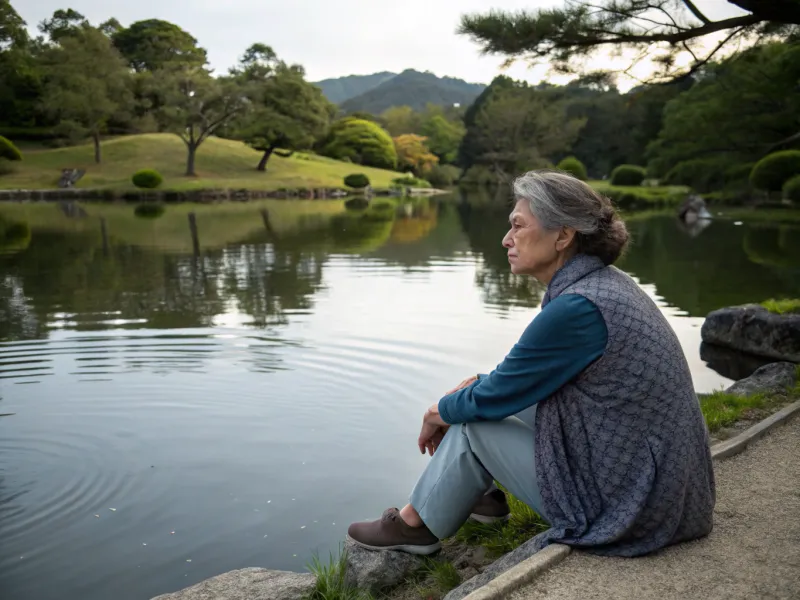35 Triggers That Lead Women Over 60 To Leave Long-Term Marriages

In the quiet corners of a well-lived life, a woman often finds herself reflecting on the years spent in a marriage that no longer feels like home. It’s not just a sudden whim or fleeting thought; it’s a culmination of years—decades, even—of feeling unseen, unheard, and unappreciated.
The decision to leave a long-term marriage at the age of 60 or beyond comes not from impulse but from clarity, a profound realization that life is too short to be spent in emotional isolation.
The years of sacrificing personal dreams, tolerating emotional distance, or compromising her sense of self come to a head, leading to that pivotal moment where she chooses her own well-being over the comfort of routine.
This article explores the 35 unique triggers that lead women over 60 to make this courageous decision, highlighting the emotional, psychological, and situational factors that contribute to such a significant life shift.
1. Emotional Disconnection Over Time

For many women, the emotional disconnection that creeps into a marriage over the years becomes the heaviest burden to bear. It’s not just about the absence of conversation, but the lack of meaningful connection that makes her feel isolated in her own home.
She finds herself yearning for a partner who listens, understands, and values her feelings. As days turn into years, her attempts to bridge the emotional gap are met with silence or indifference, deepening the chasm between them. It’s the quiet moments, sitting across from each other at dinner without words, that highlight the emotional void. This profound loneliness becomes unbearable, pushing her to seek a life where she feels emotionally fulfilled.
In the end, it’s her realization that life is too short to spend in an emotionally barren marriage that gives her the strength to leave. She longs for emotional intimacy, the kind that resonates with warmth and understanding. The decision to walk away is not easy, but it is necessary for her emotional well-being and happiness.
2. Shifting into a Caregiver Role

When a partner’s illness or aging turns a loving relationship into a caregiver scenario, many women find themselves burdened with responsibilities they never anticipated. The dynamic shift from equal partners to caregiver and dependent can create resentment and emotional fatigue.
Suddenly, her days are filled with medical appointments, dietary plans, and constant attention to her spouse’s needs. The inequality in the relationship becomes stark, and she feels her own needs and desires slipping away under the weight of responsibility. Over time, the emotional and physical strain of caregiving without adequate support or appreciation takes a toll.
The realization that she is more caretaker than partner can lead to a deep-seated sense of loss for the life she once knew. Leaving becomes an act of reclaiming her life and autonomy, a step towards finding balance and respect for her own needs.
3. Loss of Romantic and Physical Intimacy

The loss of romantic and physical intimacy signals a deeper emotional divide that many women find insurmountable. What begins as subtle changes—fewer hugs, less hand-holding—eventually becomes a stark absence of any affectionate gestures. Without the warmth of physical connection, the marriage shifts from an intimate partnership to what feels like a mere coexistence.
The void of touch and tenderness is replaced by an unspoken tension, building a wall between them. For many, the lack of intimacy becomes a daily reminder of unmet needs and emotional neglect. It’s not just about physical closeness but the emotional bonding it represents.
Her decision to leave is rooted in a desire for more than just a partner in name—she seeks a relationship where she feels cherished and valued both physically and emotionally.
4. One-Sided Effort to Maintain the Relationship

In many marriages, the burden of maintaining the relationship often falls disproportionately on the woman. Her efforts to nurture and sustain the marriage go unnoticed or unreciprocated, leading to a profound sense of exhaustion and futility. She finds herself constantly initiating conversations, planning activities, and making compromises, yet receiving little in return.
Her partner’s indifference leaves her feeling undervalued and unimportant, as if the marriage is a one-person endeavor. Over time, this imbalance becomes more than she can bear. The emotional and logistical weight of a marriage that feels one-sided and unsupported leads her to reassess her life.
She reaches a breaking point where the desire for a partnership built on mutual respect and effort outweighs the comfort of familiarity. Leaving becomes a step towards finding a relationship where her contributions are appreciated and reciprocated.
5. Retirement Forces More Togetherness

Retirement, a time often anticipated with joy, can unexpectedly intensify marital tensions. With both partners home, the unresolved issues that were once camouflaged by work schedules or separate routines become glaringly evident.
The constant proximity, rather than fostering closeness, amplifies the existing cracks in the relationship. Every small annoyance, previously brushed aside, now becomes a source of friction, making the atmosphere tense and uncomfortable.
For some women, retirement highlights how different their lives and expectations have become. The dream of shared leisure and harmony is overshadowed by continuous bickering or silence. This incessant discomfort can prompt a woman to reevaluate her happiness and decide to leave, seeking a more peaceful and fulfilling life outside the confines of a claustrophobic marital environment.
6. The Empty Nest Shifts Priorities

The phenomenon of the empty nest can bring a profound shift in perspective for many women. With children grown and out of the house, the distractions of parenting fade, leaving space to reflect on the core dynamics of the marriage.
Without the constant bustle of family life, many women find themselves examining their own needs and desires more closely. The realization dawns that the marriage, once maintained for the sake of the children, no longer fulfills her. This newfound clarity often brings a stark understanding of her happiness or lack thereof within the marriage.
The absence of shared responsibilities with children reveals the emotional distance between her and her partner. For many, this understanding propels them towards the courage to leave, choosing to pursue a life that aligns more closely with their personal happiness and growth.
7. Long-Term, Unaddressed Resentment

Resentment, when left unaddressed, can quietly erode the foundation of a marriage over the years. Small disappointments and unmet needs accumulate, each incident layering over the last until they form a barrier between partners.
The avoidance of confrontation or the inability to resolve conflicts perpetuates this emotional rift. It’s the unspoken grievances and the silence in moments that should have been filled with dialogue that compound the distance. For many women, the weight of this unacknowledged resentment becomes unbearable.
The realization that these issues will likely remain unresolved prompts a deep sense of disillusionment. Leaving the marriage becomes a necessary step to unburden herself and find a space where her feelings are acknowledged and her needs are met.
8. A Health Scare Brings Clarity

A health scare can serve as a stark wake-up call, prompting deep reflection on life’s priorities and relationships. Whether it’s her health or her partner’s, the confrontation with mortality often brings clarity and urgency.
During these moments, many women reassess their lives, questioning whether their marriage supports their emotional and physical well-being. The fragility of life becomes a catalyst for change, pushing them to prioritize happiness and fulfillment. It’s a profound recognition that time is limited, and every moment counts.
Women often emerge from these experiences with a redefined perspective on what truly matters. For many, this means pursuing a life that resonates with joy and purpose, even if that means stepping away from a marriage that has become more of a drain than a source of support.
9. Loss of Personal Identity

Years spent focusing on a partner’s needs or the demands of family life often lead women to feel they’ve lost a sense of themselves. The role of wife and mother, while fulfilling, can also overshadow their individual identity and desires.
As time passes, the realization that her own dreams and ambitions have taken a backseat becomes more pronounced. She finds herself questioning who she is outside of the roles she’s played for decades. This loss of identity can be a powerful motivator to leave a marriage that doesn’t nurture her individuality.
Her decision to step away is not just about leaving a relationship but reclaiming herself. It’s an empowering move to rediscover her passions, interests, and the person she wants to be in this chapter of her life.
10. Chronic Emotional Neglect

Chronic emotional neglect leaves many women feeling invisible in their own homes. The consistent dismissal or disregard for their emotions creates a void where love and support should be. Living in an environment where her feelings are invalidated or overlooked leads to a profound sense of isolation.
It’s not just about being physically alone but feeling emotionally abandoned by the one person who should be her closest ally. Over time, the weight of this neglect becomes too heavy to carry. She craves acknowledgment and connection, which seems perpetually out of reach within her marriage.
Leaving becomes a necessary step towards finding a life where her emotions are seen and valued, and where she can finally be at peace with herself.
11. Unresolved Betrayal or Infidelity

Infidelity leaves an indelible mark on any relationship, and its effects can linger long after the initial incident. For many women, the breach of trust, even if forgiven, creates a chasm that never fully closes.
The attempt to rebuild and move forward often feels like walking on a tightrope, where any small misstep can reopen the wounds. The constant effort to maintain trust becomes exhausting, overshadowing moments that should be filled with joy.
Eventually, the realization that the relationship never fully healed leads to a decision to leave. The desire for a life where trust is not a constant battle outweighs the fear of starting anew. For many, it’s a chance to find peace and emotional security in a space free from the shadows of past betrayals.
12. Feeling Unheard or Dismissed

Being unheard or dismissed repeatedly in communication erodes confidence and self-worth. Every conversation that ends with her voice unheard adds to the growing pile of frustrations and unspoken words.
Over time, the realization that her thoughts and feelings are consistently overlooked becomes unbearable. It’s the moments where she feels invisible, even in the presence of someone who should know her best, that cut the deepest. For many, the decision to leave is born from the desire to be in a relationship where her voice matters.
She seeks an environment where dialogue is reciprocal, and her presence is acknowledged and valued. Walking away becomes not just an escape from silence but a step towards finding a relationship where she feels truly heard.
13. Financial Imbalance or Control

Financial imbalance or control within a marriage can create deep-seated resentment and a sense of powerlessness. When one partner holds the reins of financial decisions without accountability, it skews the power dynamics.
For many women, this imbalance becomes a source of frustration and discontent. It’s not just about the money but the autonomy and respect that financial independence represents. The recognition that financial control is being used as a tool of dominance or manipulation pushes many women to reassess their situation.
Leaving becomes a path to regain control over her own life and finances, allowing her to build a future where she has a say in her economic well-being and independence.
14. Refusal to Grow or Adapt

Personal growth is a continuous journey, and when one partner refuses to evolve, it creates a disconnect that can be hard to bridge. Women who embrace change often find themselves at odds with partners who remain stagnant.
The refusal to grow or adapt to new circumstances or perspectives becomes a glaring disparity in the relationship. Her journey towards self-discovery and emotional growth feels hindered by a partner unwilling to join her.
Eventually, the divergence becomes too significant to ignore. She realizes that her own progress and happiness are being compromised by staying in a relationship rooted in the past. Leaving becomes an opportunity to continue her journey without the weight of someone who refuses to move forward.
15. Dismissive or Invalidating Behavior

Dismissive or invalidating behavior from a partner chips away at self-esteem and creates a toxic environment. When her concerns are minimized or dismissed outright, it breeds feelings of inadequacy and frustration.
Over time, these patterns become emotionally exhausting, leaving her questioning her own worth and perceptions. It’s the subtle denials of her reality that accumulate into a heavy burden. For many women, the decision to leave is prompted by the need to validate their own experiences and emotions.
She seeks a relationship where her perspective is respected and valued. Walking away becomes an act of self-preservation and empowerment, allowing her to reclaim her voice and self-worth.
16. Subtle Emotional Manipulation

Subtle emotional manipulation—whether through gaslighting, guilt-tripping, or passive control—can be insidious, slowly eroding self-confidence and autonomy. It often goes unnoticed until the cumulative effect becomes undeniable.
These manipulations manifest as constant second-guessing, confusion, and a pervasive sense of guilt for wanting more. She finds herself walking on eggshells, adjusting her behavior to placate her partner’s unpredictable reactions.
It’s the realization that this pattern is not a normal part of a healthy relationship that prompts many women to leave. Her departure is a move towards clarity and freedom, breaking free from a web of manipulation to embrace a life of authenticity and empowerment.
17. Lack of Physical Closeness

The absence of physical closeness in a marriage often signals deeper issues of emotional detachment. While sex may not be the priority, the yearning for simple physical affection—hugs, hand-holding, a gentle touch—remains strong.
When these gestures disappear, it leaves a void that words cannot fill. The lack of touch feels like a withdrawal of love and connection, creating a cold and distant relationship. For many women, this absence becomes intolerable.
Her decision to leave is fueled by the desire for a relationship that embraces physical intimacy as a natural expression of love and connection. She seeks a space where warmth and affection are abundant, not scarce.
18. Diverging Visions for Later Life

As life progresses, differing visions for the future can create a rift that is hard to bridge. While she dreams of exploration and new experiences, her partner may prefer the comfort of routine and familiarity. These diverging paths highlight fundamental differences in values and desires.
Her aspirations for a vibrant, adventurous later life feel stifled by a partner resistant to change. The realization that these differences are an enduring source of conflict prompts many women to reassess their relationship.
Leaving becomes a pursuit of a life aligned with her dreams and values, a step towards living fully and authentically in the years ahead.
19. Witnessing Their Partner Treat Others Better

Witnessing a partner treat others with more kindness and respect than they show at home can be a painful realization. The disparity in treatment becomes a glaring indicator of the emotional neglect she faces.
It’s in these moments, watching her partner’s warm interactions with friends or even strangers, that the absence of such kindness towards her becomes starkly apparent. This realization often leads to feelings of inadequacy and resentment. The decision to leave is driven by the desire to be valued and respected equally, not just by her partner but by herself.
She seeks a relationship where kindness and respect are a given, not a selective display reserved for others. Walking away becomes an act of self-worth and a step towards finding a more equitable and loving partnership.
20. Verbal or Emotional Abuse

Criticism, belittling, or constant negativity—especially when normalized over time—becomes a toxic presence in a marriage. These behaviors, often dismissed as minor or typical, take a significant toll on emotional well-being.
The realization that this is not just ‘the way things are’ but a form of abuse can be life-altering. It prompts a reassessment of her situation, recognizing the need for a healthier and more supportive environment.
Leaving an abusive relationship is a courageous step towards reclaiming her peace and dignity. She seeks a life free from the shadows of verbal and emotional abuse, where she can heal and thrive in a space of respect and love. Her departure is a powerful declaration of self-worth and resilience.
21. Desire for Peace over Partnership

When the stress and discord within a marriage outweigh the comfort and companionship, many women find themselves longing for peace above all else. It’s the realization that the partnership no longer provides solace but instead adds to life’s burdens.
The constant tension and unresolved conflicts create an environment that is emotionally exhausting. She dreams of serenity, a space where her mind and heart can rest without the constant strain of a tumultuous relationship.
Choosing peace over partnership becomes a transformative decision. Leaving is an act of self-love, driven by the desire to create a life filled with tranquility and emotional freedom. It’s about prioritizing her well-being and finding joy in the quiet moments she can now embrace without the shadows of marital discord.
22. Loss of a Loved One Shifts Perspective

The loss of a loved one often brings a stark reminder of life’s impermanence and the urgency to live meaningfully. This profound shift in perspective can prompt women to reassess their own lives and relationships.
Witnessing the fragility of life, many women confront their own mortality and question whether their current circumstances align with their true desires and happiness. The realization that time is not infinite pushes them to contemplate what truly matters.
For some, this leads to the courageous decision to leave a marriage that no longer serves them. It’s an assertion of their right to pursue a life that reflects their values and aspirations. The departure, while difficult, is a step towards embracing the life they envision before time slips away.
23. Discomfort with the Person They’ve Become

Years spent in a marriage can sometimes lead to discomfort with the person one has become, shaped by compromise and unspoken sacrifices. Many women find themselves questioning the version of themselves that has emerged from decades of marital dynamics.
This realization often prompts introspection, as they grapple with feelings of resentment or bitterness that have quietly accumulated. It’s a moment of profound self-awareness, acknowledging that the relationship has molded aspects of their identity that no longer resonate.
Leaving becomes a step towards shedding this uncomfortable skin and rediscovering themselves anew. It’s an empowering decision to reclaim their true self, free from the constraints of a marriage that has stifled their growth. Her departure is a journey towards personal authenticity and fulfillment.
24. Chronic Emotional Silence

Chronic emotional silence, even in the absence of overt conflict, can be as painful as constant arguments. The lack of dialogue and emotional exchange creates a void that is equally exhausting and disheartening.
This silence becomes a tangible presence, lingering in every room and every interaction. It’s the absence of laughter, shared dreams, and simple conversations that marks a profound disconnect. For many women, breaking free from this emotional silence becomes a necessity.
The desire to be heard and to engage in meaningful conversations drives them to seek a more fulfilling life outside the marriage. Leaving becomes an act of seeking connection and vibrancy, a chance to find a relationship where silence is replaced by warmth and understanding.
25. Imagining Life Outside the Marriage

Imagining life outside the marriage often becomes a turning point for women who feel trapped in unfulfilling relationships. The vision of living alone or differently starts to feel more liberating than daunting.
This contemplation of a new beginning fills her with hope and a sense of possibility. The fear of the unknown is gradually replaced by excitement about the freedom to shape her own life. For many, this imaginings crystallize the courage to act.
The realization that staying no longer serves her happiness becomes a catalyst for change. Leaving becomes a path to personal freedom and self-discovery, allowing her to embrace a future crafted by her own desires and choices.
26. Living with a Negative, Bitter Partner

Living with a partner who exudes negativity and bitterness can be emotionally draining. The constant presence of criticism, pessimism, and emotional heaviness weighs heavily on her spirit. Over time, this negativity permeates every aspect of life, overshadowing moments that should be filled with joy and contentment.
She finds herself yearning for positivity and lightness that her current environment lacks. For many women, the decision to leave is prompted by the desire to escape this pervasive gloom. She longs for a life where optimism and happiness are not rare occurrences but daily realities.
Her departure is a step towards creating an environment where positivity can flourish, free from the shadows of bitterness.
27. Experiencing Connection Elsewhere

Experiencing connection and understanding elsewhere often highlights the emotional void within a marriage. A new friendship or witnessing a healthy relationship can remind her of what she’s missing at home. These interactions serve as a powerful contrast, shedding light on her own relationship’s deficiencies.
The warmth and validation she feels in these external connections become a stark reminder of the emotional neglect she endures. The decision to leave is often fueled by the realization that she deserves such connection and companionship in her own life.
It’s a move towards embracing relationships that are nurturing and fulfilling, where she feels truly valued and understood. Her departure is a step towards cultivating meaningful connections that enrich her life.
28. Prioritizing Mental Health

Prioritizing mental health becomes a crucial factor for many women when considering leaving a marriage. Therapy or self-work often reveals insights about how the relationship affects her emotional and psychological state.
The realization that her marriage contributes to anxiety, depression, or low self-worth becomes a pivotal moment. It’s an acknowledgment of the need for a healthier environment that supports her mental well-being. Leaving is a powerful act of self-care, prioritizing her mental health over the comfort of familiar dysfunction.
She seeks a life where her emotional well-being is nurtured and valued, free from the constraints of a relationship that undermines her happiness. Her departure is a commitment to healing and personal growth.
29. Years of Subtle Control

Subtle control in a marriage often manifests as micromanaging, criticism, or decision-making that leaves little room for autonomy. Over the years, these patterns can erode her sense of independence and self-worth.
The constant navigation of her partner’s expectations and dictates creates an environment where freedom feels like a distant memory. Each decision and action is weighed against potential repercussions, stifling her true self.
For many women, the decision to leave is driven by the desire to reclaim autonomy and the freedom to make choices without fear of control. Leaving becomes a profound step towards living authentically, free from the chains of subtle manipulation. It’s a journey back to herself, where her voice and choices are respected and valued.
30. No Longer Afraid of Being Alone

The fear of being alone is a powerful force that keeps many women in unfulfilling marriages. However, there comes a point when the fear of staying becomes greater than the fear of solitude. The realization that she is capable of thriving on her own, and may even prefer it, becomes a liberating moment.
The potential for new experiences, personal growth, and independence outweighs the comfort of a stagnant relationship. Leaving becomes an act of courage and empowerment, a declaration of her ability to embrace life on her own terms.
It’s a journey of self-discovery and resilience, where she finds strength and joy in her own company, free from the constraints of a marriage that no longer serves her.
31. Repeated Refusal to Seek Help

Repeated attempts to seek help or counseling are often met with resistance or refusal by her partner, leaving many women feeling trapped and unsupported. The unwillingness to address problems becomes a significant barrier to healing and growth.
Her efforts to improve the relationship are consistently thwarted by a partner who refuses to acknowledge the issues or seek solutions. This cycle of rejection breeds frustration and hopelessness, highlighting the futility of her attempts.
For many, the decision to leave arises from the recognition that she deserves a partner willing to engage in mutual growth and healing. Leaving is an act of self-respect, choosing to invest in a future where her efforts to nurture a healthy relationship are reciprocated and valued.
32. Wanting to Model a Better Life for Future Generations

The desire to model strength and self-respect for future generations often inspires women to leave marriages that no longer serve them. She envisions a legacy where her children and grandchildren see her making courageous choices.
This aspiration to be a role model becomes a powerful motivator. She wants to demonstrate that it’s never too late to prioritize personal happiness and emotional freedom, setting an example of resilience and empowerment. Leaving is not just about her own life but creating a narrative of strength and independence for those who look up to her.
It’s a commitment to living authentically, inspiring future generations to pursue happiness and well-being without compromise. Her departure is a testament to the power of choice and the importance of living a life true to oneself.
33. The Fear of Regret Outweighs the Fear of Change

The fear of regret, rather than the fear of change, often becomes the driving force behind the decision to leave a long-term marriage. She imagines a future filled with more of the same dissatisfaction and disconnection.
This looming sense of what might have been lost urges her to act. The fear of spending her remaining years in a state of unfulfilled potential and happiness outweighs the comfort of familiarity. Leaving becomes a brave step towards embracing change and the uncertainty it brings.
It’s about choosing possibility over complacency, guided by the hope for a more fulfilling and joyful life. Her departure is a bold affirmation of her right to pursue happiness, even if it means venturing into the unknown.
34. Seeing Other Women Leave Gives Hope

Witnessing other women leave unfulfilling marriages and find happiness can instill hope and courage. Their stories of transformation and renewal become beacons of possibility, illustrating that a better life is within reach.
These examples serve as reminders that she is not alone and that change is possible at any stage of life. The realization that others have successfully navigated the journey gives her the strength to consider her own path. Leaving becomes a step towards embracing the potential for joy and fulfillment, inspired by the resilience and bravery of those who have gone before her.
It’s a journey towards creating her own story of happiness and empowerment, grounded in the belief that she, too, can find peace and satisfaction beyond the confines of a long-term marriage.
35. A Final Realization of Self-Worth

A final realization of self-worth often emerges after years of compromise, leading women to acknowledge their right to a more fulfilling life. The journey towards recognizing her value and needs becomes a powerful catalyst for change.
This newfound self-respect brings clarity and courage. She understands that she deserves more than the emotional neglect and dissatisfaction she’s endured, igniting a desire for a life that honors her worth. Leaving becomes a profound affirmation of her self-worth and autonomy.
It’s a decision to embrace a future where she prioritizes her happiness and well-being. Her departure is a testament to her resilience and strength, choosing to walk a path that celebrates her value and potential for joy.
